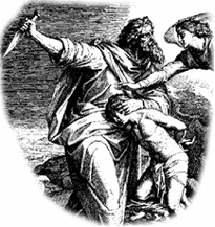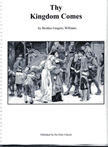Chapter 2. Abraham Uncivilized
Part 5 The Code of Abraham

Abraham was able to muster 300 armed
men from his own household and was often traveling with a large
contingency of people. What was his system of government? There is no
doubt that his fame and respect was known throughout the world and
even his servants were honored and respected. How did he manage to
keep order and manage the daily ministration to these people? What
system of law and order did he teach?
The codification of law at Ur had
replaced the Ana Ittishu, which was the ancient equivalent of our modern “words and
phrases”, and was a
part of an ancient system, preserving the “Sumerian Family
Laws”.
Such codes made provisions that
mandated the customs of marriage, adoption, liability, and property,
as well as obligations to neighbors, penalties for false accusations,
and rules for hiring laborers as slaves for a period of time
(employment). The importance of a code was that law was no longer a
matter of words and phrases or maxims of wisdom to be
interpreted by a jural society of your peers, but had become an
earthly command of compliance from a central authority. Such central
systems of authority had accompanying penalties and punishment and
the power of enforcement by a lawgiver and the gods, or judges, he
appointed. Law was no longer in the hands of God or His people but in
the hands of the ruling elite.
When the Code of Hammurabi appeared,
the “king is already the source of justice; the judges are
strictly supervised, and appeal to the king is allowed.”
Over four thousand years ago in the
kingdom of Ur, there were systematic methods and specified rules in
courts of record. They settled, “disputes arising out of
sales, inheritance, gifts, or divorce.” There were
different kinds of courts with different jurisdictional authority. “When the claim had been ‘in the king’s name’
and rebutted, the case was settled by an oath either taken by one of
the parties or by a witness.”
You could be executed for questioning
the authority of the princes and gods appointed by the king.
“And
Haran died before his father Terah in the land of his nativity, in Ur
of the Chaldees.” Genesis 11:28
Haran did not just die, he was
executed as a result of some presumed infraction of the codified
laws. The word “died” is from [twm] muwth, which means “to die, kill, have one executed… to
die prematurely… to kill, put to death, dispatch”.
“And
Terah took Abram his son, and Lot the son of Haran his son’s
son, and Sarai his daughter in law, his son Abram’s wife; and
they went forth with them from Ur of the Chaldees, to go into the
land of Canaan; and they came unto Haran, and dwelt there.”
Genesis 11:31
The word “took” is a strong word. It is from laqach, meaning “take possession of”. The ancient stories tell us
that Haran was executed for the crime of defying the authority of the
gods of the city. Abraham had done the same, but he was spared.
Terah took
possession of his family and exited the jurisdiction of Ur. This was
because neither the Father nor the individuals of the family had possession of themselves before they left. They were persons
or souls of the state. Terah, Haran, Nahor, and Abram were persons
within the jurisdiction of the city walls and under its authority.
Terah had learned some of a lesson, which cost him the life of his
son, Haran. Although he detested the tyranny of Ur, he was not
willing to let go of that power over other men and trust solely in
God and His liberty and free dominion.
Abram had
separated himself from the Asuras in India, then he left Ur and,
finally, he left the city-state of Haran and his own family. That
City-State had been established by his own father, Terah, and named
after his executed brother, Haran. Though he had expatriated from
family and the civil power of his people, he had continued to tithe
to the righteous King of peace. According to the Ana Ittishu, or “Family Laws”, the righteous king was the eldest generator of the family.
Abraham
remained righteous in his honor to his generator, e.g. righteous in
his generations. He became Abraham after he refused to take even a shoe latch of the spoils of the City-State Sodom and was
blessed by that righteous King of peace for his faithfulness to the
ways of God the Father.
“That
I will not [take] from a thread even to a shoelatchet, and that I
will not take any thing that [is] thine, lest thou shouldest say, I
have made Abram rich:” Genesis 14:23
The generations of Abraham were
Shem, begat Arphaxad, Shelah, Eber, Peleg, Reu, Serug, Nahor, Terah,
Abram who became Abraham. Amongst all the descendants of Shem,
there were many that disagreed and even fought over who should be the
rightful heir to the blessings of Shem. Shem was rightful king as elder of the family of man and, according to Bible chronologists,
Shem was still around when Abraham expatriated from his father and
the matrix of the City-State. Since Noah and his wife had died, Shem
was a righteous king of peace. He was without Father and
Mother and was possessor of all his rights. Shem was sui juris according to the family laws that preceded the codification by
kings. Although he had produced many heirs, no one had been chosen.
There was no one worthy of the honor and blessing of that royal
office of the righteous King of Peace.
And
Melchizedek [righteous king] king of Salem [peace] brought forth
bread and wine: and he [was] the priest of the most high God. And he
blessed him, and said, Blessed [be] Abram of the most high God,
possessor of heaven and earth:” Genesis 14:18-19
Return to Index of Chapters of "Thy Kingdom Comes"

Order the book
Thy Kingdom Comes
http://www.hisholychurch.org/order/materialskingdom.html










